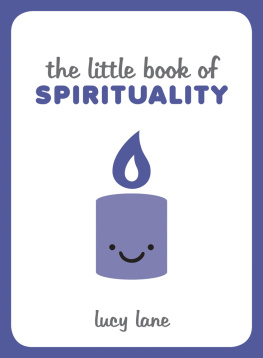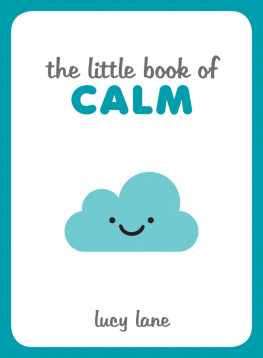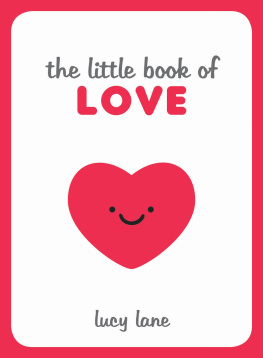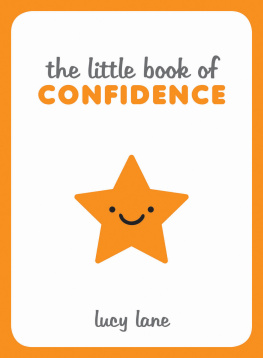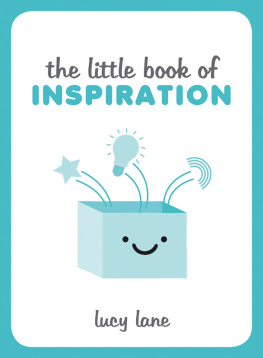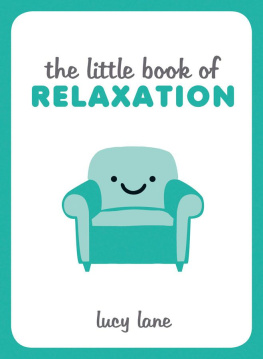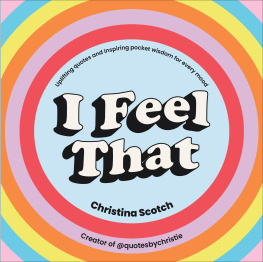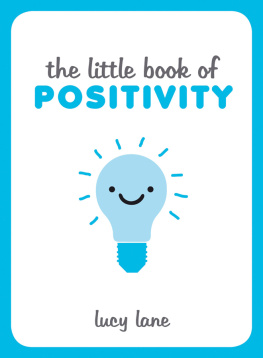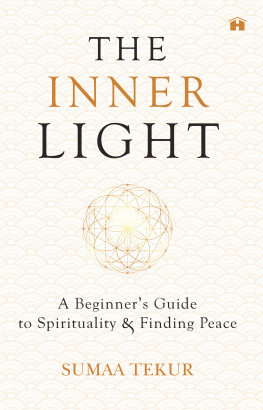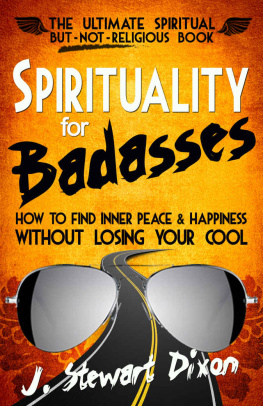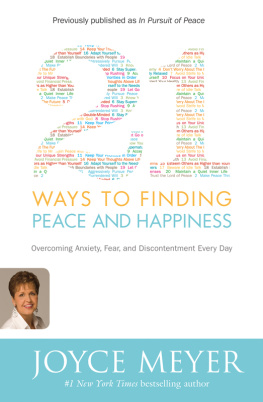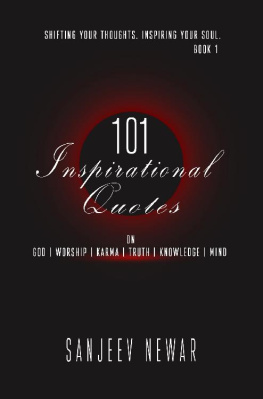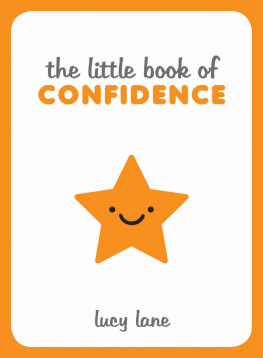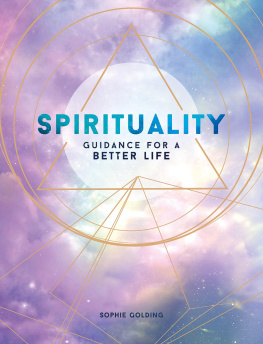THE LITTLE BOOK OF SPIRITUALITY
Copyright Summersdale Publishers Ltd, 2018
Text by Vicky Edwards
Candle icon Blan-k/Shutterstock.com
All rights reserved.
No part of this book may be reproduced by any means, nor transmitted, nor translated into a machine language, without the written permission of the publishers.
Condition of Sale
This book is sold subject to the condition that it shall not, by way of trade or otherwise, be lent, resold, hired out or otherwise circulated in any form of binding or cover other than that in which it is published and without a similar condition including this condition being imposed on the subsequent purchaser.
An Hachette UK Company
www.hachette.co.uk
Summersdale Publishers Ltd
Part of Octopus Publishing Group Limited
Carmelite House
50 Victoria Embankment
LONDON
EC4Y 0DZ
UK
www.summersdale.com
eISBN: 978-1-78685-834-4
Substantial discounts on bulk quantities of Summersdale books are available to corporations, professional associations and other organisations. For details contact general enquiries: telephone: +44 (0) 1243 771107 or email: .
For Moira
CONTENTS
INTRODUCTION
Modern-day spirituality is a quest for personal development and a more enlightened existence. It is not concerned with the value of material things, but with core values such as altruism, integrity and compassion. Whether your journey is inspired by faith or the pursuit of spiritual fulfilment, this handy little book is packed with inspiring quotations and simple tips to help you its a tool-kit to support you on your way to serenity.
GET TO KNOW YOUR SPIRITUAL SELF
Spirituality is a personal journey where we try to establish and nurture a connection with something greater than ourselves. To do this, we must first look to ourselves: at our beliefs, our values and our actions. What could you change or improve upon? Based on your life to date, create an honest personal moral inventory. Explore your character traits, ideals and beliefs, especially around the themes of fairness, integrity and love, and acknowledge your strengths as well as your weaknesses.
The following questions will help you discover your core values and create your moral inventory:
What are my positive and negative qualities?
Do I have a belief system?
Are there outstanding apologies or amends I need to make to myself or others that would give me greater peace of mind?
What resentments am I carrying that it would benefit me to let go?
This truthful moral inventory provides a sound basis from which to begin your journey to enlightenment.
KNOWING YOURSELF IS THE BEGINNING OF ALL WISDOM.
Aristotle
Grant me the serenity to accept the things I cannot change, the courage to change the things I can, and the wisdom to know the difference.
Reinhold Niebuhr
BE MINDFUL
The objective of mindfulness is to learn how to cope with your emotions without feeling overwhelmed by them. Focusing on the here and now is an effective means of achieving a state of calm. Try sitting quietly, closing your eyes and concentrating on steady breathing. Stop your mind from darting about and let the natural rhythm of your breath guide your way. If your mind wanders, gently bring it back to the task in hand.
Another helpful mindfulness exercise is to take a deep breath and then slowly exhale. Concentrate on that outward breath and ask yourself if it feels as if it is carrying any particular emotion. If the answer is yes, identify the emotion and observe it simply by name fear, anger, sadness. Dont attempt to discover its origin or to justify it; just calmly sit with it. Experts in psychology claim that by specifically labelling an emotion that troubles us we decrease its intensity.

The pursuit , even of the best things, ought to be calm and tranquil .
Marcus Tullius Cicero
IF YOU WANT TO CONQUER THE ANXIETY OF LIFE, LIVE IN THE MOMENT, LIVE IN THE BREATH.
Amit Ray
CHALLENGE ACCEPTED
When the going gets tough, a state of acceptance can be difficult to maintain. Emotions such as anger, indignation and denial can scupper any sense of serenity that we might have. Likewise, having to accept what we perceive as the unacceptable can make our blood boil to the point that we are incapable of all reason. Instead, try to see that a situation simply is, rather than is wrong/unfair.
Acceptance doesnt mean rolling over and taking whatever comes our way, good or bad. Ultimately, acceptance is about seeking a more peaceful and productive way forward, without being distracted by negative and unconstructive emotions. When our mental capacity is unclouded we are in a stronger position to be objective and practical.

A journey of a thousand miles begins with a single step.
Lao Tzu
In every day, there are 1,440 minutes . That means we have 1,440 daily opportunities to make a positive impact.
Les Brown
THINK POSITIVE
Emotional health and spiritual balance require a positive state of mind, so cultivate a can do mindset until it becomes instinctive. Practising positivity, especially towards others, diminishes negative emotions such as hate, envy and jealousy and leaves your mind and heart clearer and lighter. Be willing and ready to seek out silver linings even in the darkest of situations.
Make a conscious decision to stay alert for negative thoughts and be ready to challenge them whenever they pop into your head. If they do, try a mindful exercise like visualising your negativity being carried away on the breeze and out of your sight.
Choose your company wisely: if you know someone to be a doomsayer who always steals your sunshine, give them a wide berth. Or be prepared to call them out on their habit of always seeing the glass as half empty. People can only drain your positivity if you allow them to.

The first step toward change is awareness . The second step is acceptance .
Nathaniel Branden
What you need is to recognise the possibilities and challenges offered by the present moment, and to embrace them.
Thomas Merton
GIVE YOURSELF PERMISSION TO FAIL
Failure is one of the most useful lessons we can learn: it shapes our next attempt, making us aware of where the pitfalls are and what we need to do better. Fear of failure is the most common reason people give for not doing something, and yet in not doing it they are failing without even trying!
Failure teaches us much more than success does remember that the likes of Steve Jobs and Thomas Edison built their careers and their business empires on the back of their failures in so far as their early efforts taught them what didnt work. When we pick ourselves back up, having learned from our mistakes, the taste of success when it comes is all the sweeter. To fail is to learn. To learn is to be closer to triumph and spiritual enlightenment.


